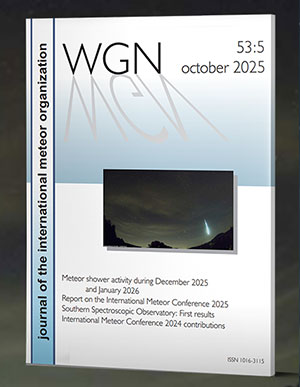A total of 327 visual observing periods have been collected
for the 2004 Leonid meteor shower. A grand total of 1249 shower
meteors was reported. Dust trail computations gave predictions for Nov 8 ~23h30 (30-rev trail), Nov 17 ~9h20 (2-rev),
Nov 19 ~6h40 (20-rev), Nov 19 ~21h40 (8-rev), Nov 21 ~8h20
(26-rev), Nov 21 ~10h (25-rev). The encounter with the 8-rev
trail was expected to show ZHRs of several 10s to perhaps
65 per hour.
Since the predicted activity levels were not much exceeding
the general background activity of the Leonid meteor shower,
it was clear that the detection of individual dust trail
natures will not be easy. As a matter of fact, the observations do not show any peaks coinciding with one of the
encounter times.
The enhanced rates of November 8 are far from significant,
as they are based on very few shower meteors seen from Europe
at low radiant elevations. No reports from Asia are available
for that UT-evening.
------------------------------------------------------ Date (UT) Time Solarlong nINT nLEO ZHR ------------------------------------------------------ Nov 08.939 22:32 226.802 11 4 10 +- 4 Nov 08.975 23:24 226.838 10 5 6 +- 2 Nov 09.021 00:30 226.885 6 5 8 +- 3 Nov 12.275 06:36 230.157 6 8 4 +- 1 Nov 14.175 04:12 232.070 4 13 6 +- 2 Nov 15.984 23:37 233.893 7 12 5 +- 1 Nov 16.862 20:41 234.778 9 51 17 +- 2 Nov 17.484 11:37 235.405 7 33 10 +- 2 Nov 17.795 19:05 235.719 10 89 36 +- 4 Nov 18.012 00:17 235.938 20 55 26 +- 3 Nov 18.077 01:51 236.003 18 62 22 +- 3 Nov 18.420 10:05 236.349 5 30 12 +- 2 Nov 18.941 22:35 236.875 22 97 35 +- 4 Nov 19.037 00:53 236.972 31 115 32 +- 3 Nov 19.094 02:15 237.029 12 35 26 +- 4 Nov 19.198 04:45 237.134 10 47 16 +- 2 Nov 19.441 10:35 237.380 10 161 24 +- 2 Nov 19.767 18:24 237.709 12 47 20 +- 3 Nov 19.865 20:46 237.808 10 46 23 +- 3 Nov 19.900 21:36 237.843 10 41 22 +- 3 Nov 19.944 22:39 237.887 14 56 24 +- 3 Nov 19.983 23:36 237.927 17 26 16 +- 3 Nov 20.016 00:23 237.960 22 58 27 +- 4 Nov 20.059 01:25 238.003 17 62 21 +- 3 Nov 20.143 03:26 238.088 13 37 10 +- 2 Nov 20.851 20:25 238.803 6 34 17 +- 3 Nov 21.363 08:43 239.320 8 20 4 +- 1 ------------------------------------------------------
The activity profile is based on the observing periods by Harshad Abhyankar (India), Puya Ahmadifard (Iran), Alexandre Amorim (Brazil), Karl Antier (France), Lars Bakman (Denmark), Ricardas Balciunas (Lithania), Peter Bias (USA), Andreas Buchmann (Switzerland), Vladimir Burgic (Serbia), Tibor Csorgei (Slovakia), Charuta Deshpande (India), Shrikant Dhumal (India), David Dickinson (USA), Sietse Dijkstra (the Netherlands), Jelena Djuricin (Serbia), Lucio Furlanetto (Italy), George W. Gliba (USA), Robin Gray (USA), Madhura Gokhale (India), Pavol Habuda (Slovakia), Takema Hashimoto (Japan), Amir Hassanzadeh (Iran), Davood Hemati (Iran), Veli-Pekka Hentunen (Finland), Kamil Hornoch (Czech Republic), Greg Hudson (Australia), Robert Javer (Italy), Carl Johannink (the Netherlands), Jakub Kapus (Slovakia), Martin Kapus (Slovakia), Srdjan Keca (Serbia), Soheil Khoshbinfar (Iran), Ralf Koschack (Germany), Richard Kramer (USA), Mayuri Kulkarni (India), Rhishikesh Kulkarni (India), Peter van Leuteren (the Netherlands), Ming-hui Liang (China), Mike Linnolt (USA), Robert Lunsford (USA), Qiang Ma (China), Adam Marsh (Australia), Pierre Martin (Canada), Mikhail Maslov (Russia), Alastair McBeath (UK), Norman McLeod (USA), Huan Meng (China), Ivica Mihaljevic (Serbia), Koen Miskotte (the Netherlands), Amruta Modani (India), Markku Nissinen (Finland), Jens O. Olesen (Denmark), Carles Pineda Ferre (Spain), Nilesh Puntambekar (India), Pulin Raje (India), Jurgen Rendtel (Germany), Branislav Savic (Serbia), Nikhil Sharma (India), George Spalding (UK), Wesley Stone (USA), Ouyang Tianjing (China), Shigeo Uchiyama (Japan), Michel Vandeputte (Belgium), Valentin Velkov (Bulgaria), Nilesh Wani (India), Hao Wu (China), Quanzhi Ye (China), Ilkka Yrjola (Finland), Menglin Zhang (China), Jin Zhu (China).
The solar longitudes refer to equinox J2000.0, ZHRs are
computed with a population index of r=2.0 and a radiant
height correction of 1/sin(hR). nINT is the number of
observing periods in the average, nLEO the number of
Leonids involved.




 You saw something bright and fast? Like a huge shooting star? Report it: it may be a fireball.
You saw something bright and fast? Like a huge shooting star? Report it: it may be a fireball.  You counted meteors last night? Share your results with us!
You counted meteors last night? Share your results with us!  You took a photo of a meteor or fireball? You have a screenshot of your cam? Share it with us!
You took a photo of a meteor or fireball? You have a screenshot of your cam? Share it with us!  You caught a meteor or fireball on video? Share your video with us!
You caught a meteor or fireball on video? Share your video with us!